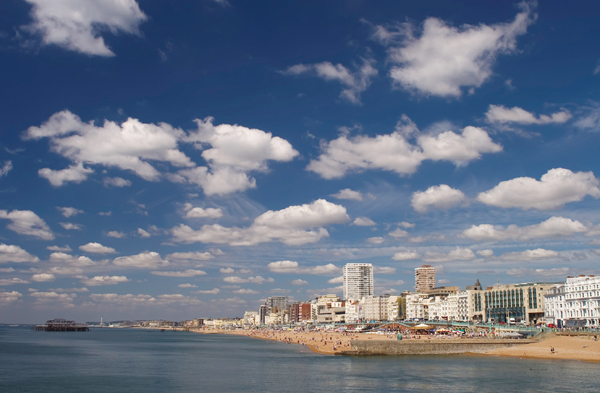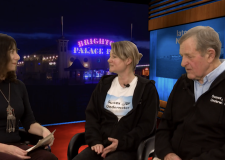Crime & Punishment
The fight to be the elected police commissioner for Sussex is under way. Frank le Duc reports

As scientific surveys go, it wasn’t very scientific. In a Brighton pub, I asked 20 people to name the chairman of Sussex Police Authority. None of them could name Steve Waight, the long-serving Worthing councillor who has held the post since May last year. Nor could any of the 20 name a single member of the police authority. The most common response was: “What’s the police authority?” The second most common response was a shrug or the words “I don’t know.”
The low level of awareness may help explain why Police Minister Nick Herbert believes that we need US-style elected police chiefs. I asked the same 20 people what they knew about elected police and crime commissioners (PCCs). Just six had even an inkling that we would be going to the polls to pick the person in charge of Sussex Police.
One of the 20, with more than a hint of sarcasm, said: “A crime commissioner? Do we really need someone to commission crime? Surely you can get put away for that?” While another joked: “It sounds like something out of Batman – you know, Commissioner Gordon.” But he was on the right lines.
A key reason for the reforms is to improve accountability. Directly electing the man or woman at the top is likely to mean that he or she has a higher public profile and is more likely to explain his or her decisions. That’s the thinking behind the reforms and behind the periodic push for elected mayors. Mr Herbert, the MP for Arundel and South Downs, said that the elections would give the public a real say in policing. He said: “Elected PCCs will hold chief constables and their forces to account, making the police answerable directly to the communities they work for.”
Critics are worried that the established parties will battle it out for the police commissioner posts and as a result our neutral and impartial police service will be politicised. It is a concern raised by Ian Chisnall, who is standing as an independent. One of his opponents, the Labour candidate Godfrey Daniel, has already said: “I won’t be a cheerleader for Conservative/Lib Dem cuts in Sussex.” The newly selected Conservative candidate Katy Bourne cited former Metropolitan Police Commissioner Sir Ian Blair – now Lord Blair of Boughton. He said that the job was already political.
Political sackings
His departure from the Met was a case in point. Some believed that his links with the Labour government were too close. Boris Johnson ran for Mayor of London saying that he believed that a change in leadership was needed at Scotland Yard. And within months of his election he forced Sir Ian out. In different circumstances, when David Blunkett became Home Secretary he brought about the departure of the chief constable of Sussex, Paul Whitehouse, after the shooting of James Ashley in Hastings. Generally, though, much to do with policing appears to have stayed one step removed from the party political fray.
Last month Lord Blair returned to this theme when he told The Huffington Post: “I don’t know quite how much the coalition has thought about how much of the map will be coloured red. You’re going to have local elected politicians who have a different political view than the elected government, plus a very independent inspectorate. I think this may be a good thing, but it may be difficult for the Home Office to control policing in the way it has done for the past 100 years.”
And seven years ago in the BBC’s annual Dimbleby lecture, he said: “Clemenceau described war as being ‘too important to leave to the generals’. Equally, policing is too important to leave to police chiefs – or to party politics alone. We need – you need – to move from policing by consent, which is the bedrock of our policing settlement but which is passive, to policing by direct collaboration, which is active. The police service needs public engagement and debate to help it fit the multicultural, open society to which the London Olympics aspire, a Britain in which I want to live and in which I want my children to live. That Britain cannot succeed without a police service to match. You need to decide what kind of police service we want.”
November Poll
One of the minor rites of late August and early September is receiving a form asking us to register to vote. It’s happening earlier this year and most of us should already have received our forms. This is to ensure that as many people as possible are able to vote on Thursday 15 November for the first Sussex Police and Crime Commissioner.
Ian Chisnall, who is standing as an independent, said that it would have been better to have held the elections in May as the government originally intended. They would then have coincided with council elections in some areas although not Brighton and Hove. He said: “Turnout in November is bound to be lower due to the need for voters to visit their local polling station when the weather is much less certain and the days are shorter.”
Unsurprisingly, the 51 year old has been passionately calling for an independent candidate to be elected, citing senior Labour and Conservative Party members who have previously expressed the same or similar views. He said: “Sussex is well known for its independence in many things. We must ensure that we elect an independent Police Commissioner and avoid the risk of politicising our police force, which Michael Howard first identified in 1995.
“However, it is vital that independence is not seen as an end in itself. According to recent reports, people such as one-time Sussex resident and glamour model Jordan have expressed interest in standing in these elections.
“I have a proven track record in working with local politicians across all parties yet retaining the sense of independence that the voluntary and business sectors are known for. I am experienced in the governance of large organisations and understand how local communities can engage with Sussex Police to facilitate the most effective way of combatting crime and anti-social behaviour.”
Mr Chisnall, a community activist who lives in Brighton, is the chairman of Sussex Central YMCA and works for Churches Together in Sussex, a network of a thousand churches. He also set up Fare Share, the food recycling project in Brighton, and helped start the Brighton Street Pastors scheme.
His two main opponents are Godfrey Daniel for Labour and Katy Bourne for the Conservatives. Mr Daniel, who studied at Sussex University, is a police authority member and a long-serving Hastings and East Sussex councillor. Mrs Bourne is a relatively recently elected Mid Sussex councillor, business angel and consultant. The Greens and Liberal Democrats are not expected to field official candidates but there may be a smattering of other independents if they can raise a £5,000 deposit and 100 nomination signatures.
What to expect
Mrs Bourne said on her website: “Help me put the community back into policing and make us all ‘Safer in Sussex’.” After her selection she said: “I’m absolutely delighted to have been selected as the Conservative candidate. I put myself forward for the role because I care about our community and because I believe every resident of Sussex has the right to be safe on the streets and in their own homes.
“Under my leadership Sussex Police will be truly accountable to local people which they haven’t been in the past. Most people haven’t heard of the police authority and don’t know what it does. This is a great opportunity for people. This is what the localism agenda is all about.”
Mr Daniel said: “We need to enhance the best practices of policing in our area. For me, anti-social behaviour continues to be a major priority, particularly as it disproportionately hits less well off communities. My priorities include neighbourhood policing and dealing effectively with domestic violence, hate crime and drugs. I have always opposed compulsory redundancies, be they of police officers or police staff. I will oppose the privatisation of police services and will work closely with all those in the police ‘family’ to enhance policing.
“Labour, however, has a proud record of investing in policing and I am particularly
proud of our neighbourhood policing and the Crime and Disorder Act 1998 which also
brought in partners to our fight to reduce crime.
Neighbourhood policing works well in most areas, primarily thanks to the additional support of police community support officers, introduced by a Labour government. I want to see neighbourhood officers remaining in post long enough to develop meaningful local relationships with the community.
“A great deal of crime is fuelled by drug and/or alcohol dependency but the police cannot reduce this problem in isolation so we need to work more closely with partners and residents if we are to effect real change.”
Mr Chisnall said: “The Police and Crime Commissioner will… set the strategic direction for Sussex Police in conjunction with the chief constable, who retains full control of the operational aspects of policing.
“I believe passionately that preventing crime is better for all of us than trying to solve it later, although of course all of our communities experience the pain of criminal activity from time to time. This is at the heart of the priorities of Robert Peel in establishing policing in 1829. I will therefore place a strong emphasis on crime prevention in my manifesto, representing as it often does the most cost effective solution. Inevitably this approach does not lead to such powerful headlines as proving that a crime would otherwise have taken place is far from easy.
“I have a strong commitment to the style of neighbourhood policing being carried out in Sussex and wish to see this work promoted and carried out in collaboration with all local communities across Sussex. This partnership approach is exemplified by the work of organised groups such as Neighbourhood Watch and similar schemes (Farmwatch, Boatwatch, Hotelwatch, etc) or Street Pastors, Streetwatch, etc.”
Whoever wins, the commissioner will be scrutinised by a Police and Crime Panel. The panel will have 17 members – like the current police authority – but 15 members of the panel will be councillors compared with nine members of the police authority, including Councillor Ben Duncan, from Brighton and Hove. Given the number of Conservative-controlled councils in Sussex, the political complexion of the new panel should be easy to predict. The panel is currently looking to recruit two unpaid independent members. Police authorities currently have eight independent members, including three magistrates.
Mr Chisnall said that this political change makes it even more important to elect an independent police and crime commissioner. Yet in his Dimbleby lecture, Sir Ian Blair said: “Policing is becoming not only central to our understanding of citizenship, it is becoming a contestable political issue as never before.”
Sir Ian Blair’s forecast is Ian Chisnall’s concern.





















